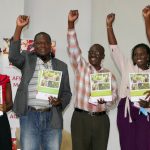We, the Members of the Alliance for Food Sovereignty in Africa – a network of 36 civil society actors, representing smallholder farmers, pastoralists, hunter/gatherers, indigenous peoples, faith-based institutions, women and youth networks, consumer networks and environmentalists from across Africa, in our 3-day meeting on agroecology, seed sovereignty, food policies, and climate change;
Cognizant of the AU’s call to its Member States to “Act with a sense of urgency on climate change and the environment”, and to this end pursue “Sustainable exploitation and management of Africa’s diversity for the benefit of its people”, as enshrined in Agenda 2063: “The Africa We Want”;
Inspired by AU’s enduring pan-African Vision of “An integrated, prosperous and peaceful Africa, driven by its own citizens and representing a dynamic force in the international arena”;
Also Inspired by Agenda 2063’s principle of an “African approach to development and transformation” as a critical enabler to Africa’s Transformation;
Pursuant to our Shared Vision of a food sovereign Africa, realised through just and equitable ways of her people interacting in harmony with nature, harnessing and enhancing their traditional knowledge systems, controlling their territories, livelihoods and governance systems and related decision-making processes, and holding their governments and corporate powers to account for their legacy to the future generations;
Taking note of the confirmation by the Intergovernmental Panel on Climate Change (IPCC) that agroecology has the potential to feed the growing population and that smallholder farmers are a major contributor to the global food system;
Believing that African family farming/production systems based on agroecological and indigenous approaches are absolutely critical in sustaining food sovereignty and livelihoods of the largely rural and disadvantaged urban populations;
Gravely Perturbed by overt and covert acts by corporate industrialisation actors that have caused massive land grabs, destruction of biodiversity and ecosystems by way of greenhouse gas emissions and pollution; increasing dependence on fossil fuel, synthetic fertilisers and soil degrading agro-toxins; and displacing and destroying the livelihoods and cultures of indigenous peoples, especially pastoralists and hunter-gatherers;
Deeply Concerned with the inextricable connections between climate change, land degradation, deforestation, and industrial agriculture – a prime mechanism of agrarian extractivism and extractivist development – and how these drive social and political instability and food insecurity on the continent, which further aggravates the systemic, existential crises we face globally;
Troubled by the connections between armed conflicts in Africa and acute food insecurity, the number of African people experiencing acute food insecurity, which has doubled since 2018, to the effect that 12 out of 15 African countries facing the greatest food insecurity crisis are also presently the hotspots of armed conflicts that remain the primary drivers of acute food insecurity on the continent;
Aware that exploitative development interventions to date have and continue to reinforce indebtedness, inequalities and social exclusion, as well as deepen dependency on destructive, short-sighted and short-lived fossil fuel and capital intensive projects, and global agricultural and forest value chains, which all contribute to creating conditions for extreme vulnerability to shocks, including but not limited to the COVID-19 pandemic and its negative socio-economic ramifications;
Encouraged by a process of policy analysis and stakeholder consultations involving continental, regional and national level actors in food systems, agroecology and ecosystems, which started in late 2020, in which AFSA and the African Union Commission collaborated to gather evidence and establish buy-in and insights leading to the development of an Africa Food Policy Framework;
Mindful of the role played by traditional African diets in enhancing the resilience of some African communities during the COVID-19 pandemic and non-communicable diseases (NCDs), which have reached epidemic levels;
Worried about emerging research evidence that rapid and unplanned urbanisation, with the consequent shift in the labour force largely from food-producing to non-food producing jobs, and a rising African middle class, is affecting rural land use and changing our food systems;
Alarmed by the rapid erosion of African cultures that coincides with the loss of biodiversity, declining air and water quality, the degradation of our soils, which is becoming a major issue affecting the livelihoods of many, while the growing retail/supermarket sector is also destroying and displacing local food systems and local markets and traditional value chains; thus limiting access to local, diverse foods and healthy diets;
RESOLVE to make this Statement on the Position of African Civil Society Actors working to promote agroecology and seed systems and dutifully and respectfully:
- APPLAUDS the African Union Commission and, in particular, its Department of Agriculture, Rural Development, Blue Economy and Sustainable Environment, for accepting to collaborate with AFSA in the development and implementation of the concept for developing an Africa Food Policy Framework, which is aimed to be an authoritative, Africa-driven rallying point for asserting Africa’s policy directions that safeguard Africa’s biodiversity (including water sources and oceans), food sovereignty, and protect the right to food.
- URGES the African Union Assembly of Heads of State and Government and its Policy Organs, including the Pan-African Parliament, to protect the millions of peasant smallholder family farmers, pastoralists, fisherfolks, indigenous communities, custodians of nature, and women and youth from ultra-capitalist acts of exploitation and manipulation of the food systems, by sanctioning large-scale investments done in partnership with, by and for these grassroots actors and communities, guided by the principle of free, prior and informed consent, as enshrined in the United Nations Declaration on the Rights of Peasants (UNDROP) and the United Nations Declaration on the Rights of Indigenous Peoples (UNDRIP).
- ALSO URGES the African Union to endorse the initiative to develop an Africa Food Policy that guarantees the urgent and pressing need for Africa to feed itself within the current context of global volatility, multi-layered crises, and chaotic climate change with its disastrous consequences.
- FURTHER URGES the African Union and its policy organ, the Specialised Technical Committee on Agriculture, Rural Development, Water and Environment, to endorse a mechanism (or Action Agenda) for Involvement of Civil Society Organizations concerned with agroecology, seed systems and food systems so that together with African Union Commission, they work to support and influence rights-responsive and sovereignty-inspired transformation agenda for African food systems.
- IMPLORES the African Union to endorse the recommendation for the African Union Commission to lead the process of developing an Africa Food Policy Framework that ensures buy-in and involvement of wider actors that will exact AU’s aspirations for a food sovereign Africa

































